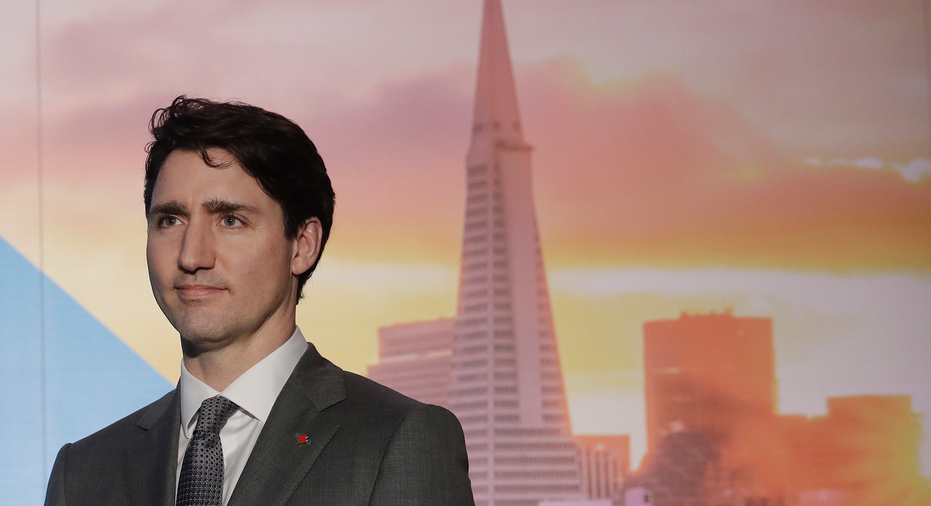Trudeau pitches Canadian globalism to California tech firms

SAN FRANCISCO – Canadian Prime Minister Justin Trudeau on Thursday pitched Canadian globalism and the country's new fast-track visa as reasons why Silicon Valley companies should consider Canada as a place to do business and spend money.
Trudeau brought his charm offensive to the San Francisco Bay Area amid increasing unease over U.S. immigration policy and while talks continue over the North American Free Trade Agreement.
The heated debate over immigration since the election of President Donald Trump has provided a clear opening for Canada to promote itself to Silicon Valley.
As American employers worry about access to foreign workers, Canada is offering a two-week, fast-track employment permit for certain workers, dubbed the "global skills strategy visa."
Government-sponsored billboards in Silicon Valley pitch: "H1-B Problems? Pivot to Canada." Recruiters from cities in Canada attend Canadian university alumni events in the valley, urging graduates to come home "to your next career move in the Great White North."
Trudeau demurred when asked whether Trump's immigration efforts are making the sales pitch easier, pointing to the power of globalism.
"We know that bringing in great talent from around the world is an enormous benefit, not just to the companies that want to do that, but to Canadian jobs and to our country as a whole, so we're going to continue to do that," he said.
His stops Thursday were designed to showcase recruiting successes.
Salesforce CEO Marc Benioff announced the online business software company will invest another $2 billion in its Canadian operations.
And San Francisco-based AppDirect, an online management platform whose co-CEO first met Trudeau in political science class at McGill University in Montreal, said it would add another 300 jobs in Canada in the next five years.
Trudeau is also meeting with Amazon Chief Executive Jeff Bezos as Bezos considers the location for its second headquarters. Toronto, which has created a government-sponsored innovation hub for tech companies, was the only one of several Canadian cities that applied to make the shortlist.
The San Francisco Bay Area has become increasingly important to the Canadian government, said Rana Sarkar, the consul general of Canada in San Francisco. He said it fits with the "innovation strategy" the Trudeau government has promoted since its election in 2015.
"It's the global epicenter for many of these revolutions. We need to be here both offensively to ensure that we're telling our story. ... And we're also here defensively to ensure that we're here at the table when the decisions about the next economy are made," Sarkar said.
Trudeau's stop in San Francisco also highlights the already strong ties between Canada and California, particularly in research, academia and technology.
While much of the attention on the North American Free Trade Agreement has focused on physical commodities such as vehicle manufacturing, dairy and timber, skilled workers have also become increasingly mobile between the U.S., Canada and Mexico.
Google built its latest DeepMind artificial intelligence facility at the University of Alberta in Edmonton, Canada, after several of its graduates came to work on the project.
The next round of talks over the 24-year-old trade pact in Mexico later this month loomed over Trudeau's visit. Trump has called the agreement a job-killing "disaster" on the campaign trail and has threatened to withdraw from it if he can't get what he wants.
The lengthy talks have increased the political pressure and the rhetoric in Canada, where the stakes are high.
Trudeau declined to talk about specifics Thursday, but said Canada wants an agreement that is "win-win-win" for all three countries.
"We're going to continue to make an argument that it's not enough to just trade, we have to ensure that the benefits of trade are properly and fairly shared," he said.
There are hundreds, maybe thousands — no one can say for sure — of Canadians in the tech industry in Northern California, many of them on visas made possible through the trade pact.
Without NAFTA, "those (jobs) go away. That could cause immediate disruption for the tech community" on both sides of the border, said Daniel Ujczo, an international trade lawyer based in Columbus, Ohio, who has been part of the talks, now in their sixth round.
"It's unfortunately not an area that is up for discussion. Canada and Mexico keep raising worker mobility issues, but the U.S. won't discuss it," he said.
Trudeau will meet with Gov. Jerry Brown and Lt. Gov. Gavin Newsom, both Democrats, on Friday before he travels to Southern California to deliver a speech at the Ronald Reagan Presidential Library.
The location is a symbolic choice, referring to the longstanding trade relationship between the U.S. and Canada. In 1988, Reagan and then-Prime Minister Brian Mulroney signed the first free trade agreement — a precursor to NAFTA.
___
This version corrects the last name of the consul general to Sarkar, not Sankar.



















